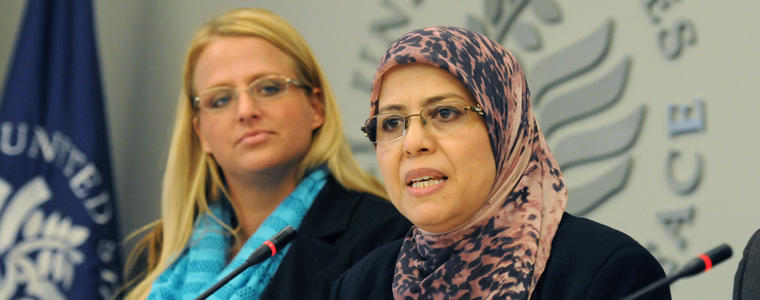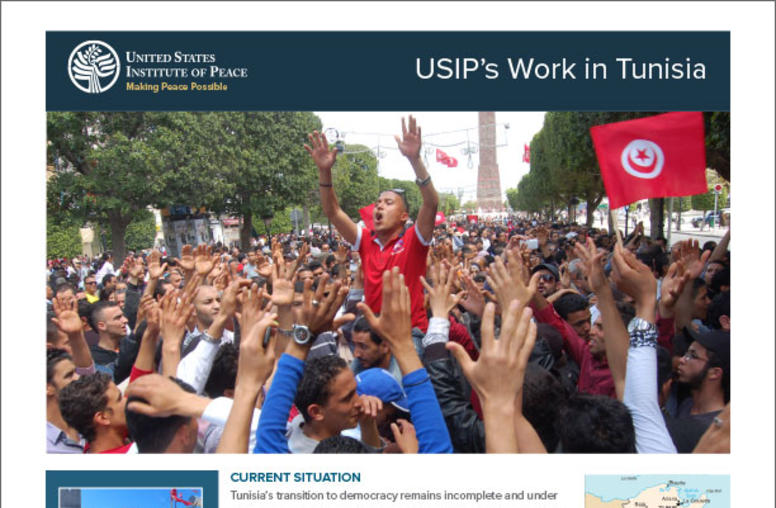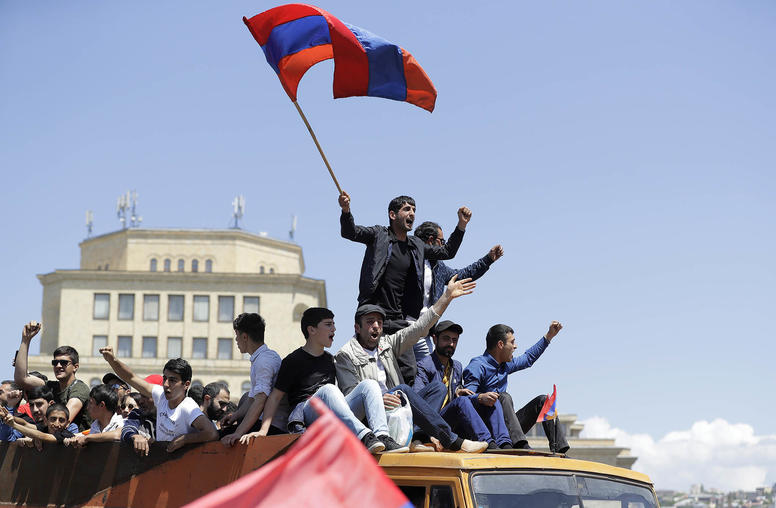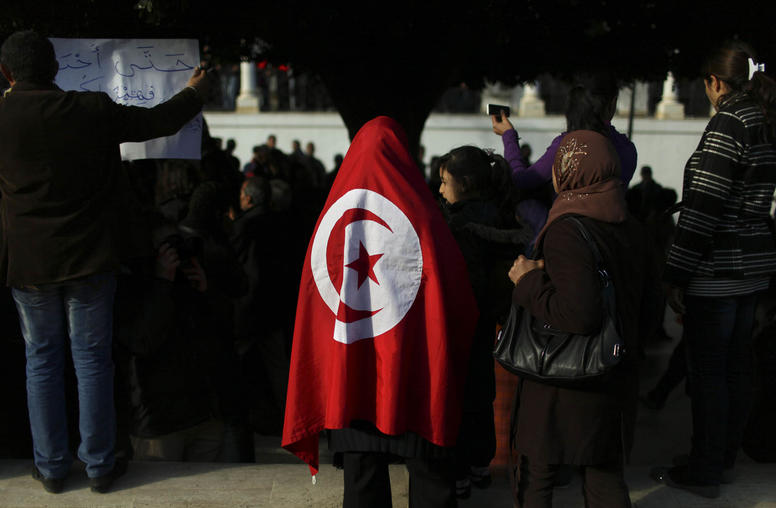Tunisian Debate Over Islam, Rights in Constitution Illustrated at USIP Event
A deputy in Tunisia’s National Constituent Assembly takes on criticisms from Human Rights Watch as the country considers a third draft of its constitution.

A discussion at the U.S. Institute of Peace over the role of Islam and human rights in Tunisia’s draft constitution illustrated the tough issues and fine lines facing the countries of the Arab Spring as they craft their new post-revolutionary political identities.
Amel Azzouz, a deputy in Tunisia’s National Constituent Assembly and a member of the Ennahda party’s consultative shura council, laid out the constitutional drafting process and the general contents of the most recent version during a panel discussion at USIP on May 9 that was co-hosted by the Project on Middle East Democracy (POMED). The new version drew suggestions for further revisions from panelist Amna Guellali, a researcher for Human Rights Watch who focuses on Tunisia and Algeria. The group published its analysis of the latest draft, the third version, on its website May 13.
“The debate falls along two parameters,” said Daniel Brumberg, a senior advisor on Middle East Initiatives at USIP who chaired the panel discussion, who has read the latest draft in Arabic and French language versions. He drew the lines at “those who want to define human rights more closely based on international standards and based on individual rights versus those who prefer or gravitate toward a more communal or collective notion of human rights or believe that personal or individual rights should be subject to certain kinds of communal notions of identity.”
The latest draft of the constitution represents an effort at compromise, Brumberg said. He called it “a considerable improvement over the previous two iterations. But that is in the eye of the beholder.”
Tunisia, which was the first to set off the revolutions of the Arab Spring that also have roiled countries including Egypt, Yemen and Syria, has extended its constitution-drafting process to deal with deep disagreements. Questions have emerged over issues such as references to Islam and cultural values and the preeminence of internationally defined human rights such as freedom of speech, assembly and religion.
Despite advantages such as a relatively peaceful history, high rates of education compared with the rest of the region and a homogenous population that helps avoid some of the sectarian rifts that have opened elsewhere, polarization has increased since autocrat Zine al-Abidine Ben Ali was driven from power. The divisions have spiraled at times into violence, including the assassination in February of Chokri Belaid, a secular figure leading the opposition against the moderate, Islamist-led government.
“I fear that the Tunisian population has had perhaps unrealistically high expectations, and that their patience is wearing thin,” said Stephen McInerney, executive director of POMED.
Still, Tunisia’s open process contrasts with that in Egypt, where the form of the new constitution drafted in the aftermath of the toppling of three-decade strongman Hosni Mubarak was controlled by the country’s military.
“Of all the countries [that] have seen the upheavals of political rebellion, Tunisia represents the one Arab country where there has been, clearly, the most progress,” Brumberg said.
The 217 members of Tunisia’s Constituent Assembly were elected in October 2011 to devise a new constitution, and the moderate Islamist Ennahda Movement holds a plurality of the seats.
Azzouz said the election gave the assembly the charge of drafting a new constitution that cuts any ties with the previous “system of dictatorship and corruption” and achieves a balance of power. She said the document aspires to establish a civil state built on “citizenship and equality” and contains 48 articles, of 139 total, focusing on rights and liberties. It establishes an independent judiciary, a constitutional court and independent committees on human rights, elections and the media to support democracy.
The concept of human rights in Tunisia is in transition, Azzouz said. The country’s institutions need to recover from decades of dictatorship, corruption and oppression, she said. In addition to the emerging official structures, there is a “deep state still holding and occupying key positions,” she said. “There is sort of a perpetuation of old practices.”
“There are certainly some gaps … but we should understand, all of us, that transition is still” underway and will take time, she said. “Everybody’s learning in Tunisia.”
But despite the advantages and the inclusive constitution-drafting process that has drawn in a wide array of views and ideologies, Tunisia faces stepped-up activity by armed groups, tension on the border with Algeria and an economy in tatters, feeding grievances among the populace, said Human Rights Watch’s Guellali.
In the drafting of the constitution, the latest version is an improvement but still contains “loopholes that could be used in the future by future rulers to undermine human rights and restrict them on several bases,” she said. Most of the problems aren’t apparent within individual articles but by viewing the document as a whole and noting contradictions that could be exploited in the long run by a government that doesn’t hold moderate views, she said.
She cited passages such as one in the preamble that was added in the third draft and limits respect of universal human rights to those “that are in harmony with the Tunisian people’s cultural specificities.”
The “vague and loose concept,” Guellali said, “could mean anything for future rulers and could be used in order to empty the rights of their very meaning.”
Article 136 of the constitution also prohibits revisions “related to Islam as the religion of the state,” a provision that could be interpreted as alluding to an Islamic state or Sharia law, she said. The constitution also doesn’t recognize international conventions that Tunisia has already signed as part of the new law of the land, Guellali said.
While Azzouz insisted that Islam isn’t in contradiction with values of freedom, equality and social justice, Guellali said future governing officials could seize on the language as it is to justify human rights violations.
The discussion at USIP also drew attention to Article 34 of the new draft, which seems to guarantee the public’s access to information only if it doesn’t violate national security, the public interest or the private information of others. “Every authoritarian constitution that I know has this kind of loophole,” Brumberg said.
Joyce Kasee, a USIP program officer on North Africa, visited Tunisia recently and said that the involvement of civil society in the constitution drafting and other forms of reform seems too often driven by individuals in charge of various efforts rather than making it systematic and regular. Government officials and civil society leaders, including those in youth groups, also have been frustrated at the lack of capacity to respond effectively to crises or the need for justice to address various violations.
Tunisia’s handling of its process may become a bellwether of sorts for others in the region.
“The success of Tunisia’s transition will usher also a new era, I think, for the whole, entire region,” Guellali said.
The public conversation resulting from the constitution-drafting process has become “emblematic of a much wider discussion in Tunisia that is now going on,” Brumberg said. “We can see this process unfolding, and it’s an extraordinary one.”



